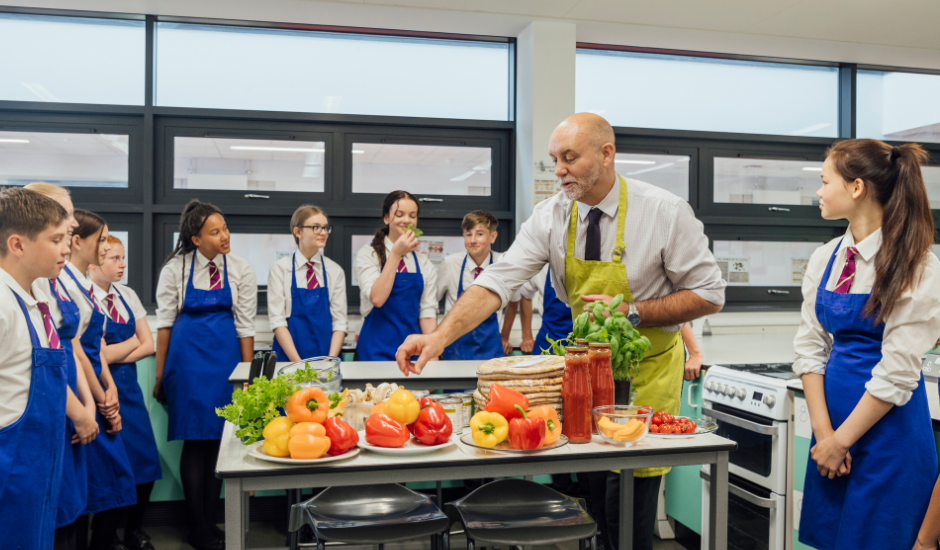As an active teen, you’re likely juggling a full schedule—school, sports, social activities, and maybe even a part-time job. With so much going on, it can be easy to overlook the role that good nutrition plays in supporting your energy levels, performance, and overall health. But if you’re striving to excel both in the classroom and on the field, what you eat is just as important as how much you train or study. Here’s why fueling your body right is essential for active teens and how schools can play a key role in promoting healthy nutrition habits.
Why Nutrition Matters for Active Teens
During adolescence, your body undergoes rapid growth and development. Nutritional needs are at their highest, and without the right balance of nutrients, you might experience fatigue, decreased performance, and a higher risk of injury or illness. Proper nutrition provides the energy your body needs to power through workouts, supports muscle recovery, and helps maintain focus in the classroom.
Here are some critical reasons why nutrition is a game-changer for active teens:
- Energy and Stamina: Teens engaged in sports or other physical activities require more energy to fuel their activities. Carbohydrates are the primary energy source for these activities. Without enough, you might feel sluggish and unable to perform your best.
- Muscle Recovery and Growth: Protein plays a vital role in building and repairing muscle tissues. Consuming adequate protein helps support muscle growth, repair, and strength, which are crucial for active teens involved in resistance training or high-intensity sports.
- Focus and Cognitive Function: Nutrients like omega-3 fatty acids, iron, and B vitamins are essential for brain health and cognitive function. A balanced diet can enhance concentration, memory, and overall academic performance.
- Bone Health: Adolescence is a crucial period for bone development. Nutrients like calcium, vitamin D, and magnesium are necessary to support bone health and prevent conditions like osteoporosis later in life.
The Role of Schools in Promoting Good Nutrition
Schools are an influential environment for shaping teens’ nutritional habits. Since students spend a significant portion of their day at school, the meals and snacks available there can impact their overall dietary habits and health. Here’s how schools can promote better nutrition for active teens:
- Offer Balanced School Meals: Schools should provide meals that include a variety of fruits, vegetables, lean proteins, whole grains, and healthy fats. This variety ensures students get the nutrients they need to fuel their activities and support their growth.
- Provide Education on Healthy Choices: Nutrition education should be part of the curriculum, teaching students about portion control, reading food labels, and understanding the impact of different nutrients on their bodies. Guest speakers, workshops, or interactive classes can help make these lessons more engaging.
- Encourage Hydration: Active teens often forget to hydrate, especially during and after physical activities. Schools should provide access to water fountains or water refill stations to encourage students to stay hydrated throughout the day.
- Create a Positive Eating Environment: Schools can promote healthy eating by making nutritious foods accessible and affordable. Canteens should prioritise offering healthier snacks over processed options, and vending machines should be stocked with water, milk, and snacks like nuts, fruits, or yogurt.
- Support for Student-Athletes: Student-athletes may need additional support to manage their nutritional needs during training and competition seasons. Schools can offer guidance on pre- and post-competition meals and snacks or partner with nutritionists to provide individualised plans.
Easy Nutritional Tips for Active Teens
As an active teen, your nutrition doesn’t have to be complicated. Here are some simple tips to help you fuel your body right:
- Start Your Day with Breakfast: Kickstart your day with a balanced breakfast that includes carbohydrates, protein, and healthy fats. A smoothie with fruits, yogurt, and a handful of nuts is a quick and nutritious option.
- Snack Smart: Choose snacks like fruits, vegetables with hummus, whole grain crackers, or a handful of trail mix to keep your energy levels up throughout the day.
- Stay Hydrated: Drink water regularly, especially before, during, and after physical activities. Dehydration can negatively affect performance and recovery.
- Plan Your Pre- and Post-Workout Meals: Eat a small meal with carbohydrates and a bit of protein an hour or two before your activity, and refuel afterward with protein-rich foods like eggs, lean meat, or a protein shake.
- Don’t Skip Meals: Even if you’re busy, try to eat three main meals and 1-2 snacks throughout the day to keep your energy levels steady.
Fueling your body right is more than just eating for energy; it’s about providing your body with the nutrients it needs to grow, develop, and perform at its best. As an active teen, prioritising your nutrition will set you up for success, both academically and athletically. By making informed choices and leaning on the support systems in place at school, you can build a strong foundation for a healthy, active lifestyle.
So, the next time you head to the canteen or pack your lunch, remember to think about what your body needs to stay strong and thrive. Fuel right, feel right!








